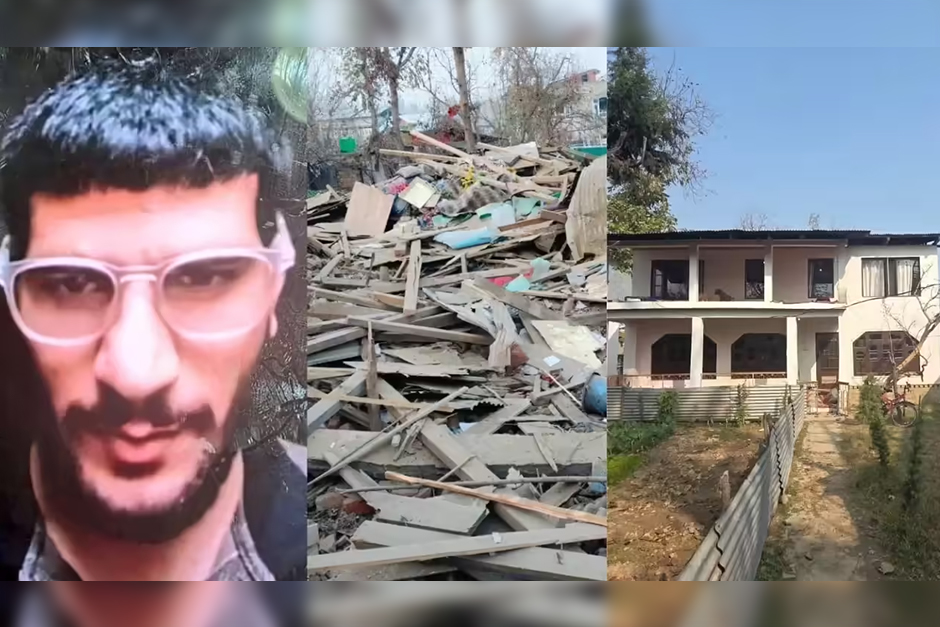In a significant development reflecting India’s relentless counter-terrorism efforts, security agencies in Jammu and Kashmir’s Pulwama district have reportedly blown up the residential house of Dr. Umar Nabi, an alleged mastermind linked to the recent Delhi car blast and the infamous 2000 Red Fort attack. The operation, executed by a joint team of the National Investigation Agency (NIA), Jammu and Kashmir Police, and the Indian Army, underscores a decisive crackdown on terror networks operating within the region and beyond.
The strategic demolition occurred in Pulwama’s Awantipora area following intensive intelligence gathering and a prolonged surveillance operation. Dr. Umar Nabi, a qualified medical professional, had reportedly transitioned into a senior operational role within a proscribed terror outfit, orchestrating terror activities from his base in Kashmir. The destruction of his suspected hideout serves as a stark message against individuals aiding or abetting terrorism.
High-Stakes Operation in Pulwama
The operation in Pulwama unfolded over several hours, beginning with a cordon-and-search operation initiated after actionable intelligence pinpointed Dr. Umar Nabi’s presence or significant links to the premises. Local residents were evacuated from nearby homes to ensure their safety before the demolition commenced. Agencies suspected the house might have been booby-trapped or used as an arsenal, necessitating the controlled detonation.
Sources indicate that the decision to blow up the house was not taken lightly but was deemed essential due to the high probability of explosives or hidden compartments within the structure, making a conventional search too hazardous. The NIA, leading the investigation, confirmed that crucial evidence linking Nabi to various terror plots, including the Delhi car blast, was being actively pursued. The precision of the operation reflects the enhanced coordination among various security forces and intelligence agencies in tackling the deep-rooted terror infrastructure.
Connecting the Dots: Delhi Car Blast and Red Fort Attack
Dr. Umar Nabi’s alleged involvement bridges two major terror incidents, highlighting the enduring nature of certain terror networks and their capability to plan operations across different timelines. While details surrounding the recent Delhi car blast remain under wraps due to ongoing investigations, initial reports suggest Nabi played a pivotal role in its planning and execution, potentially providing logistical support or masterminding the plot from Kashmir.
More notably, his alleged connection to the 2000 Red Fort attack brings a chilling dimension to the current investigation. The Red Fort attack, a brazen act of terrorism that resulted in the deaths of three individuals, was a significant event in India’s counter-terrorism history. While many perpetrators were apprehended and punished, the linking of a current operative to such an older, high-profile case suggests a deeper, perhaps generational, involvement in terror activities. Agencies believe Nabi may have been involved in the conspiracy phase or played a key facilitating role for the Lashkar-e-Taiba (LeT) outfit which was implicated in the Red Fort attack.
“This operation is a testament to our unwavering resolve to dismantle terror networks from their very roots,” stated a senior official close to the investigation, speaking on condition of anonymity. “Whether it’s a new threat or an old dossier, we are committed to bringing every perpetrator and facilitator of terrorism to justice, regardless of how long it takes. Dr. Nabi’s case exemplifies the insidious nature of radicalization, turning educated individuals into tools of destruction.”
Dr. Umar Nabi: From Medical Professional to Terror Operative
The transformation of Dr. Umar Nabi, a seemingly educated individual, into a high-value terror operative, presents a grim reminder of the complex challenges posed by radicalization. Reports suggest Nabi, despite his medical background, became deeply entrenched in militant ideology, eventually rising through the ranks to become a key planner and recruiter. His profile aligns with a disturbing trend where educated professionals are lured into extremist organizations, leveraging their skills for nefarious ends.
His alleged role in facilitating funds, logistics, and potentially even medical aid to other militants underscores the multifaceted nature of his involvement. The demolition of his home is not merely the destruction of a structure but a symbolic blow to the nexus of intellectual backing and operational planning that often supports terror outfits in the region.
The action in Pulwama sends a strong message that no individual, regardless of their background or stature, will be spared if found complicit in terror activities. As investigations continue, agencies are hopeful of unraveling more intricate details of the networks Nabi operated within, potentially leading to further arrests and the neutralization of active modules. India’s commitment to security remains paramount, with continuous efforts to safeguard its citizens from the scourge of terrorism.




